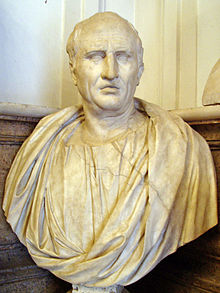He introduced the Romans to the chief schools of Greek philosophy and created a Latin philosophical vocabulary (with neologisms such as humanitas, qualitas, quantitas, and essentia) distinguishing himself as a linguist, translator, and philosopher.
Petrarch's rediscovery of Cicero's letters is often credited for initiating the 14th-century Renaissance. According to Polish historian Tadeusz Zieliński, "Renaissance was above all things a revival of Cicero, and only after him and through him of the rest of Classical antiquity." The peak of Cicero's authority and prestige came during the eighteenth-century Enlightenment, and his impact on leading Enlightenment thinkers such as John Locke, David Hume, and Montesquieu was substantial. His works rank among the most influential in European culture, and today still constitute one of the most important bodies of primary material for the writing and revision of Roman history, especially the last days of the Roman Republic.
Though he was an accomplished orator and successful lawyer, Cicero believed his political career was his most important achievement. It was during his consulship that the Catiline conspiracy attempted the government overthrow through an attack on the city from outside forces, and Cicero suppressed the revolt by executing five conspirators without due process.
During the chaotic latter half of the 1st century BC marked by civil wars and the dictatorship of Gaius Julius Caesar, Cicero championed a return to the traditional republican government. Following Julius Caesar's death Cicero became an enemy of Mark Antony in the ensuing power struggle, attacking him in a series of speeches. He was proscribed as an enemy of the state by the Second Triumvirate and subsequently murdered in 43 BC.
READ MORE HERE.
Here's something on
Old Cicero's philosophy which Angela sent to me...I am posting it for its tongue-in-cheek humor with no intention to offend anyone!
Rome’s (of the Roman Empire) Cicero’s (106 – 43 BC) philosophy is still valid even today, for any country of our globe:
The poor: work and work;
The rich: exploit the poor;
The soldier: protects both;
The taxpayer: pays for all three;
The wanderer: rests for all four;
The drunk: drinks for all five;
The banker: robs all six;
The lawyer: misleads all seven;
The doctor: kills all eight;
The undertaker: buries all nine;
The Politician: lives happily on the account of all ten.
-Author Unknown-





0 comments to Marcus Cicero
Post a Comment